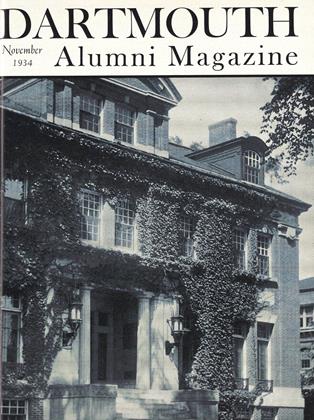ONE OF THE reasons why Bill Farnsworth '26 went to Columbia to study law was to forget all about the show business. His luck was decidedly out in the four years following 1926 when, with a Dartmouth sheepskin in hand proverbial passport to prosperity he braved Broadway and the production of legitimate drama. One luckless venture followed another until, with Leona Maricle wife of his actorclassmate, Bus Heydt in the lead, the curtain went up on a promising play. Leona had played the second feminine lead to Anne Harding in The Trial of Mary Dugan she was and still is a capable actress Bill's show didn't lack talent. But the piece itself couldn't command public favor, and the play, Bill states, was "afflicted with sudden death."
Hollywood beckoned. Paramount offered Bill an attractive proposition. As a matter of fact, he was all packed, singing "California, Here I Come," when the first pangs of conscience disturbed him. You see, Bill loves the legitimate stage. When he realized that Hollywood was in a fair way of killing his first love, and that, in a sense, he would be committing spiritual suicide by taking up arms with the cinema kings, he with a fine show of the old Irish exclaimed: "To hell with Hollywood." With what few shekels he had salvaged from 42nd Street, Bill equipped himself with secondhand law books, entered Mr. Nicholas Murray Butler's famed legal division and hereby, fellow imbibers of New England rum, hangs a tale.
Whether or not he realized it then and assuredly he did not Bill was heading for the now-somewhat-overworked "Brain Trust." In due season he graduated June 1933. The law offices of Phillip Wittenberg, 70 East 40th Street, took a long chance and Bill was on the dotted line. Granted an eight months' furlough, Bill joined the three rather distinguished gentlemen who conducted the legal division of the NRA Messrs. Donald Richberg and Blackwell Smith, and Professor Malcolm Sharpe. In one office or another Bill's been there ever since. So long, in fact, that his New York boss recently queried: "Say, Bill, isn't that eight months about up?"
First: legal adviser to the policy board of the President's Reemployment Agreement, granting substitutes to code provisions. Second: assistant counsel to the Blue Eagle Division in charge of administering the PRA. Third: associate with Sel. A. Rosenblatt in charge of amusement codes and since January '34 division administrator in charge of amusements, advertising, transportation, apparel, and service industries. Fourth: Rosenblatt's deputy in charge of all amusement codes and acting division administrator during his chief's protracted absences to the sunny west coast. At present Bill has plenty to say about the administration of the motion picture, radio broadcasting, and legitimate theater codes. Right down his alley, you see, what with the Broadway background. When, on your next peerade, you're held up by a theater ticket scalper, get in touch with the NRA's Mr. Farnsworth and he'll write somebody a strong note!
Bill's all for the New Deal and its youthful talent. Like all the young players who take cards from the New Dealer, he is genuinely fond of the Big Chief. Roosevelt, Bill says, doesn't think that because a man is a professor he is necessarily a nincompoop. Nor are grey hairs a requisite. Youth got its greatest break when Roosevelt took Washington, according to Bill. "If the youngsters are smart, they'll get into politics as soon as they can," says he. "A new political set-up is taking shape a realignment along conservative and liberal lines. Party lines are breaking down, and questions of economic importance are taking their place.
While on the subject of vocations for college graduates, Bill drew from his own experience in the show business. Bill states, "The greatest opportunity for the young college writer to gain recognition is at the offices of managers and producers who will listen to script writers. Their desks are barren of good scripts written with an eye to the requirements of the legitimate theater."
There are few good actors in the United States, according to this young producer turned Brain Truster. Here is another field for the young graduate, but and mind this but "don't make acting a livelihood unless the allowance is still running, or unless you've got some income to keep you alive." One more important "don't" Bill would leave with the prospective actor. "Don't tell the producer that you know you're good because you were elected president of the Players!"
For the statistically minded it may be pointed out that Bill signs his name William Porter Farnsworth; that he was born September 2, 1901, which, unless we've neglected our math, made Bill 33 years old not so many days agone; that Montclair, New Jersey, is his home ground; that he is over six feet tall, brown-eyed, and has grown a most suave-looking sort of mustache; that the reason our piece is not accompanied by a photograph is that Bill has faced no camera since the Aegis board hawled him under White's kleig lights down on Hanover's well-loved, long-forsaken, and oft-longed-for Main Street.
Washington, D. C.
 View Full Issue
View Full Issue
More From This Issue
-
 Article
ArticleGRADUS AD PAMPASSUM
November 1934 By The Editors -
 Article
ArticleHANOVER BROWSING
November 1934 By Herbert F. West '22 -
 Class Notes
Class NotesClass of 1930
November 1934 By Albert I. Dickerson -
 Class Notes
Class NotesClass of 1934
November 1934 By Martin J. Dwyer Jr. -
 Class Notes
Class NotesClass of 1929
November 1934 By F. William Andres -
 Class Notes
Class NotesClass of 1914
November 1934 By Edward Leech
Article
-
 Article
ArticleMILITARY STORES SCHOOL, SECOND SESSION
December 1917 -
 Article
ArticlePresident's Schedule
October 1937 -
 Article
ArticleAlumni Articles
November 1955 -
 Article
ArticleCrouthamel Returns as Backfield Coach
MARCH 1965 -
 Article
ArticleTuck expansion to begin
OCTOBER • 1986 -
 Article
ArticleThe Hanover Scene
May 1958 By BILL McCARTER '19


